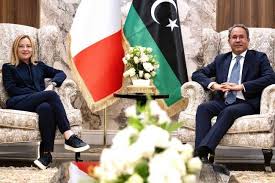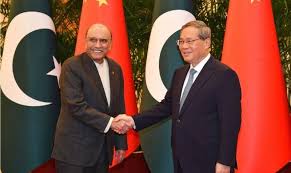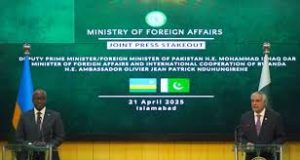Italy: Prime Minister in Libya for discussions on further migration co-operation

Rome: Prime Minister Giorgia Meloni has travelled to Libya for discussions about strengthening migration co-operation with both of the North African country’s rival administrations.
Italy and Finland have presented a joint ‘non-paper’ on ‘countering instrumentalisation of migration and migrant smuggling’ to the EU’s Foreign Affairs Council.
The Italian Civil Aviation Authority (ENAC) has issued a series of ordinances which ban the aircraft that are used by maritime search and rescue NGOs from using airports on the islands of Lampedusa, Pantelleria and Sicily.
An international journalism project has revealed that almost 23,000 unaccompanied child migrants went missing in Italy between 2021 and 2023.
On 7 May, Prime Minister Giorgia Meloni travelled to Libya for meetings with both of the North African country’s rival administrations. The issue of migration was reportedly prioritised as a “key discussion issue”. During her talks with the Prime Minister of the Government of National Unity, Abdul Rahman Dabaiba, the President of the Libyan Presidential Council, Mohamed Yunius al-Menfi, and (separately) the Head of the Libyan National Army, General Khalifa Belqasim Omar Haftar, Meloni urged her counterparts to continue Libya’s co-operation with Italy as it had “already yielded significant results”. She also proposed “further expanded cooperation” in the area of migration and invited Libyan officials to participate in working groups organised in the framework of the “Rome Process”, her initiative to address drivers of migration and forced international displacement, develop legal and safe pathways for migration and counter human trafficking and migrant smuggling. According to Il Foglio, Meloni was “seeking to obtain guarantees from the Libyan leaders that they would “more strictly control migrant departures from Libyan ports”. On the day of Meloni’s visit to Libya, the civil society association Mediterranea called for Italy to stop funding “Libyan militias” due to their complicity in human rights abuses. “Since 2017, this pact between Italy and Libya has condemned thousands of men, women and children to death, torture and various forms of suffering,” it wrote on X.
Meloni’s trip to Libya comes two weeks after Italy and Finland presented a joint document on migration to the EU’s Foreign Affairs Council (FAC). The “non-paper” on “countering instrumentalisation of migration and migrant smuggling” was presented to EU foreign ministers and defence ministers at the FAC meeting on 22 April in Luxembourg. It included a number of recommendations, including “strengthening the activities” of both the European Border and Coast Guard Agency (Frontex) and the EU Agency for Law Enforcement Cooperation (Europol) in “combating irregular migration and migrant smuggling”, concluding strategic partnerships between the EU and third countries that contribute to developing their “law enforcement and border control capabilities” and “migration management competences”, and making better use of the EU’s Common Security and Defence Policy missions and operations to “provide strategic advisory and capacity building support to the partner countries to address irregular migration”. Italian Foreign Minister Antonio Tajani said that the joint document received “important and positive feedback” from other member state representatives.
The Italian Civil Aviation Authority (ENAC) has issued a series of ordinances which ban the aircraft that are used by maritime search and rescue NGOs from using airports on the islands of Lampedusa, Pantelleria and Sicily. According to the five ordinances, which were issued 3-6 May, the civil aircraft were operating outside the regulatory framework for the SAR sector and thus represented an additional burden for the Italian coastguard, and their actions risked compromising migrants’ safety. Commenting on the flight ban, Flavio Di Giacomo from the International Organization for Migration said that the Italian decision “may hinder life-saving efforts” and that his agency was “waiting to understand its actual implementation”. The SAR NGO Sea-Watch, which operates two monitoring aircraft, issued a press release on 8 May in which it denounced the ENAC ordinances. “The regulation is a clear attempt to exclude the public from the EU’s activities in the Mediterranean,” the organisation wrote. “Journalists from many major European media outlets have repeatedly used Sea-Watch reconnaissance flights in the past to document human rights crimes in the Mediterranean,” it added. Sea-Watch’s spokesperson, Oliver Kulikowski, described the ban as “politically motivated and legally untenable” and accused Italy of attempting to “get rid of the last witnesses to European crimes in the Mediterranean”. Sea-Watch has also stated that it intended to continue its monitoring flights over the Central Mediterranean and that its Seabird 2 aircraft had taken off from Lampedusa airport two days after the relevant ENAC ordinance had been issued.
An international journalism project has revealed that almost 23,000 unaccompanied child migrants went missing in Italy between 2021 and 2023. According to Lost in Europe, of the 13 European countries that provided data, Italy had the highest number of registered unaccompanied missing children (22,899). The organisation also noted that the number of missing migrant children in Europe may be even higher than the 51, 433 it reported as the data was often “inconsistent and incomplete” and that many countries did not even collect it. In 2021, Lost in Europe found that at least 18,000 unaccompanied child migrants had gone missing after arriving in Europe between 2018 and 2020. Commenting on Lost in Europe’s findings, the Secretary General of the NGO Missing Children Europe, Aagje Ieven, described the increase in 2024 as “a sharp reminder of the giant iceberg that looms beneath the surface”. The chief executive of the UK branch of the NGO Every Child Protected Against Trafficking (ECPAT UK) described the situation as a crisis in child protection which had been “exacerbated by punitive border policies and the lack of safe and legal routes for children in Europe to move between member states safely”.





